The first generation that has been constantly exposed to digital technology has reached the age when the symptoms of dementia usually arise.
Some have stated that digital technology could adversely affect cognitive skills, but Baylor University researchers have discovered the opposite.
“You can tour the news about almost any day and you will see that people talk about how technologies hurt us,” said the co -author of the study Michael Scullin in a statement.
The risk of dementia connected to hospital visits related to cannabis, according to the study
“People usually use the terms” brain drainage “and” brain rot “and now” digital dementia “is an emerging phrase. As researchers, we wanted to know if this was true,” said Scullin.
A new hypothesis called “digital dementia” predicts a life of exposure to digital technology could adversely affect cognitive skills. (Istock)
Researchers analyzed past studies to determine the impact of technology on mental aging. Their findings, published in Nature Human Behavior, suggest that digital technologies can preserve cognitive skills.
U.S. seniors are vulnerable to these digital threats, they warn experts
For the meta-decision, researchers analyzed more than 136 studies that included 400,000 adults, with an average of six years of monitoring data.
The team concluded that the use of digital technology is correlated with 58% lower risk of cognitive impairment, even after adjusting for gender, age and education.

The use of digital technology is correlated with a risk of cognitive impairment of 58%, according to the study. (Istock)
A factor that contributes, according to Scullin, could be the cognitive challenges of adults when they interact with technology.
Click here to get the Fox News app
“One of the first things that middle -aged and older adults said is that” I am so frustrated by this computer. This is difficult to learn, “he said in launch.
“It is actually a reflection of the cognitive challenge, which can be beneficial to the brain, even if it does not feel excellent at the moment.”
Alcohol linked to brain damage to heavy drinkers is in the study
The researchers said the researchers. This “exercises” the brain and helps to keep it acute.

As technology always changes, it forces brains to adapt -to make it stronger, according to researchers involved in the study. (Istock)
Diagnostics of dementia often involve loss of ability to do daily tasks, such as taking tablets, tracking dating and browsing directions, on the UK’s UK research website.
Digital tools such as web calendars, telephone reminders and navigation applications can allow greater independence in greater adults.
Click here to register -you are in our health newsletter
The study found that “digital scaffolding”, the process of using these tools for daily tasks, “facilitates better functional results in major adults, while general cognitive functioning decreases.”
One of the very debated aspects of the effect of digital technology on our brain is the use of social networks, but according to researchers, it is not bad.

Researchers say that a benefit from technology is the greatest potential for social connection. (Istock)
Another advantage of digital technology, according to experts, is the capacity for adult aging to maintain social connections, which has been linked to a decrease in risk of dementia.
“You can now connect with families throughout generations,” said Scullin.
For more health items, visit www.foxnews.com/health
“You can not only talk to them, you can see them. You can share pictures. You can exchange emails, and everything is in a second or less. So it means that there is a greater opportunity to reduce loneliness.”
#smartphones #reduce #risk #dementia #higher #adults #study
Image Source : www.foxnews.com
